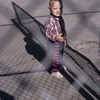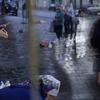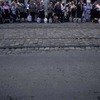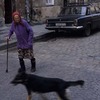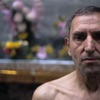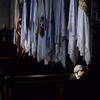Royal Prize For Yushchenko
Queen Elizabeth II on Oct. 17 presented Ukrainian President Viktor Yushchenko with a prize in recognition of his role in last year's momentous political changes in his country.
The queen awarded Yushchenko the inaugural Chatham House prize, named after a leading London think tank, at a lavish dinner ceremony in the capital's Mansion House.
Yushchenko has been praised around the world for the feats of last year's Orange Revolution, when tens of thousands of Ukrainians massed in Kyiv - and refused to leave for weeks - to protest the outcome of the presidential election. The fraud-marred balloting was ordered to be held again, and Yushchenko won.
After receiving the prize, Yushchenko said it represented "recognition, but not only recognition of my work, but actually the efforts that were made by my people in the course of many, many centuries in their attempts to get their freedom. Independence cost a lot for Ukraine, and probably freedom cost even more than that."
The newly established Chatham House prize honors an individual deemed to have made the year's most significant contribution to the improvement of international relations. It was given to Yushchenko for ensuring that last year's Orange Revolution in Ukraine did not trigger conflict within Europe.
Earlier, Yushchenko met with Prime Minister Tony Blair and discussed Ukraine's hopes for EU membership, the British leader's office said. Britain holds the rotating EU presidency and an EU-Ukraine summit is planned in Kyiv in December.
The Ukrainian president also gave a speech to the Chatham House international relations institute, during which he expressed hope that talks on possible NATO membership could begin next spring. He also said a free trade agreement with the European Union could be possible within a year to 15 months.
The Ukrainian leader said he was still pushing for World Trade Organization membership by December and said his country was close to becoming a market economy.
"The heart of Europe is in Ukraine and Europe cannot live without its heart," Yushchenko said.
NATO has stepped up cooperation with Ukraine since last year's Orange Revolution. But it has stopped short of laying out a clear timeline for membership. The military alliance has said that first Ukraine must prove its democratic credentials, fight corruption and modernize its bloated military.
In his hour-long speech at Chatham House, Yushchenko said he expected to receive an invitation to participate in an "action plan on possible membership" in NATO in April or May next year. The timeframe appeared to be earlier than Ukrainian officials have discussed in the past. A NATO official, speaking on customary condition of anonymity, said Oct. 17 that no date for launching a membership action plan with Ukraine had been set.
Analysts have said that Ukraine's best chance of being invited to join NATO could be at the alliance's 2008 summit, and senior Ukrainian officials have said that Kyiv still needs three years to meet NATO's requirements.
Meanwhile, opinion polls show that most Ukrainians remain suspicious of NATO, their old Cold War foe.
"We are convinced that the key area in foreign policy should be the European aspirations of the Ukraine. That is integration to the EU and integration to NATO," Yushchenko said.
Victor Bulmer-Thomas, director of Chatham House, praised Yushchenko's statesmanship.
"His adeptness in handling relations with other states has ensured that Ukraine, as a pivotal state in Eastern Europe and Russia's most important western neighbor, has not become the cause of a serious deterioration in relations between Russia and Western Europe," he said.
